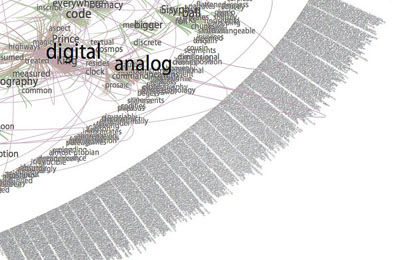…is officially live! Check it out. Spread the word.
I want to draw special attention to the Gamer Theory TextArc in the visualization gallery – a graphical rendering of the book that reveals (quite beautifully) some of the text’s underlying structures.

Gamer Arc detail
TextArc was created by Brad Paley, a brilliant interaction designer based in New York. A few weeks ago, he and Ken Wark came over to the Institute to play around with the Gamer Theory in TextArc on a wall display:

Ken jotted down some of his thoughts on the experience: “Brad put it up on the screen and it was like seeing a diagram of my own writing brain…” Read more here (then scroll down partway).

starting bottom-left, counter-clockwise: Ken, Brad, Eddie, Bob
More thoughts about all of this to come. I’ve spent the past two days running around like a madman at the Digital Library Federation Spring Forum in Pasadena, presenting our work (MediaCommons in particular), ducking in and out of sessions, chatting with interesting folks, and pounding away at the Gamer site — inserting footnote links, writing copy, generally polishing. I’m looking forward to regrouping in New York and processing all of this.
Thanks, Florian Brody for the photos.
Oh, and here is the “official” press/blogosphere release. Circulate freely:
The Institute for the Future of the Book is pleased to announce a new edition of the “networked book” Gamer Theory by McKenzie Wark. Last year, the Institute published a draft of Wark’s path-breaking critical study of video games in an experimental web format designed to bring readers into conversation around a work in progress. In the months that followed, hundreds of comments poured in from gamers, students, scholars, artists and the generally curious, at times turning into a full-blown conversation in the manuscript’s margins. Based on the many thoughtful contributions he received, Wark revised the book and has now published a print edition through Harvard University Press, which contains an edited selection of comments from the original website. In conjunction with the Harvard release, the Institute for the Future of the Book has launched a new Creative Commons-licensed, social web edition of Gamer Theory, along with a gallery of data visualizations of the text submitted by leading interaction designers, artists and hackers. This constellation of formats — read, read/write, visualize — offers the reader multiple ways of discovering and building upon Gamer Theory. A multi-mediated approach to the book in the digital age.
http://web.futureofthebook.org/mckenziewark/
More about the book:
Ever get the feeling that life’s a game with changing rules and no clear sides, one you are compelled to play yet cannot win? Welcome to gamespace. Gamespace is where and how we live today. It is everywhere and nowhere: the main chance, the best shot, the big leagues, the only game in town. In a world thus configured, McKenzie Wark contends, digital computer games are the emergent cultural form of the times. Where others argue obsessively over violence in games, Wark approaches them as a utopian version of the world in which we actually live. Playing against the machine on a game console, we enjoy the only truly level playing field–where we get ahead on our strengths or not at all.
Gamer Theory uncovers the significance of games in the gap between the near-perfection of actual games and the highly imperfect gamespace of everyday life in the rat race of free-market society. The book depicts a world becoming an inescapable series of less and less perfect games. This world gives rise to a new persona. In place of the subject or citizen stands the gamer. As all previous such personae had their breviaries and manuals, Gamer Theory seeks to offer guidance for thinking within this new character. Neither a strategy guide nor a cheat sheet for improving one’s score or skills, the book is instead a primer in thinking about a world made over as a gamespace, recast as an imperfect copy of the game.
——————-
The Institute for the Future of the Book is a small New York-based think tank dedicated to inventing new forms of discourse for the network age. Other recent publishing experiments include an annotated online edition of the Iraq Study Group Report (with Lapham’s Quarterly), Without Gods: Toward a History of Disbelief (with Mitchell Stephens, NYU), and MediaCommons, a digital scholarly network in media studies. Read the Institute’s blog, if:book. Inquiries: curator [at] futureofthebook [dot] org
McKenzie Wark teaches media and cultural studies at the New School for Social Research and Eugene Lang College in New York City. He is the author of several books, most recently A Hacker Manifesto (Harvard University Press) and Dispositions (Salt Publishing).
if:book
A Project of the Institute for the Future of the Book
